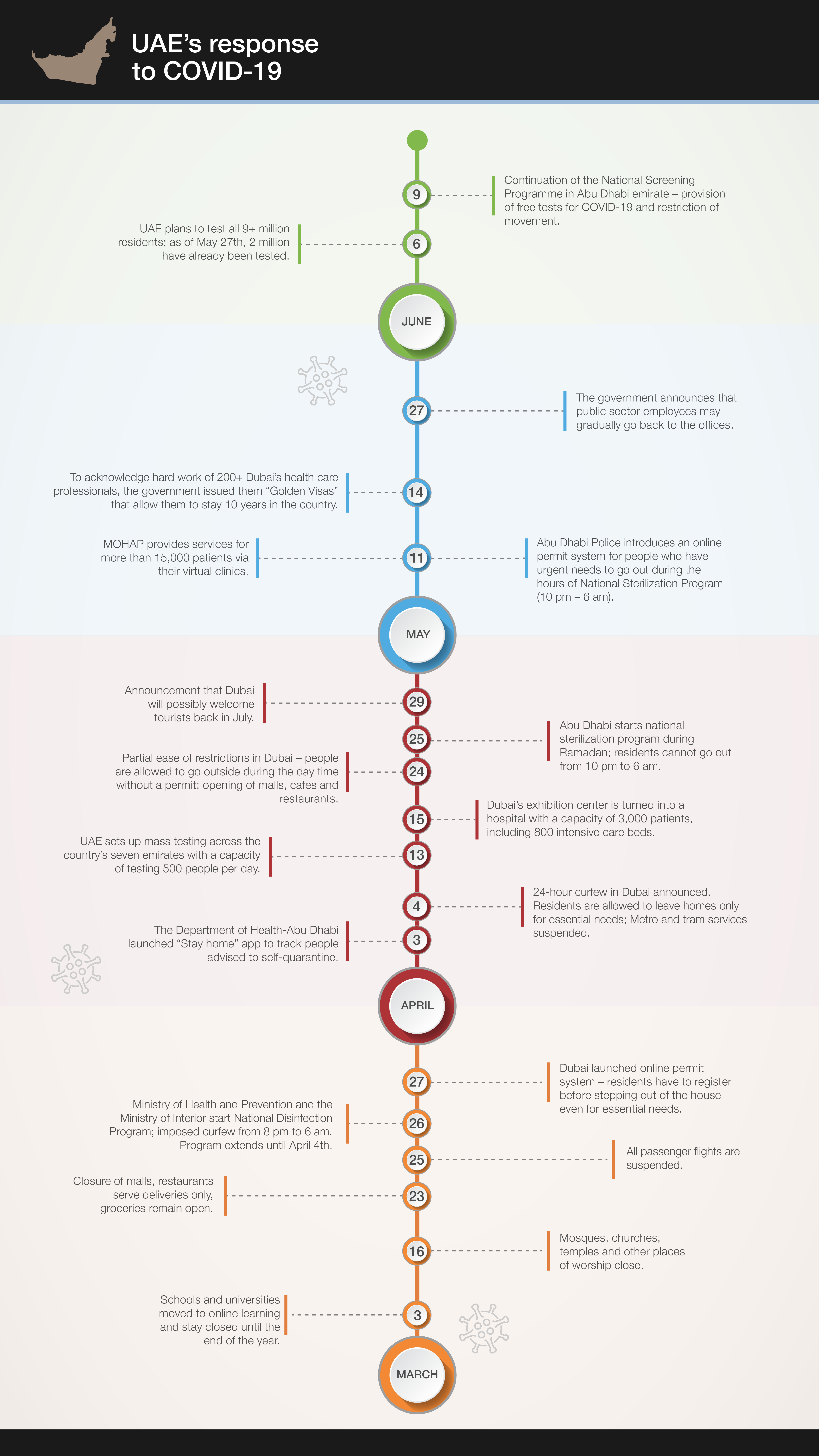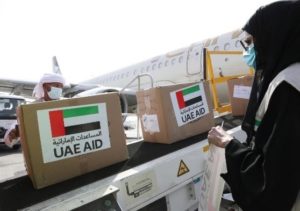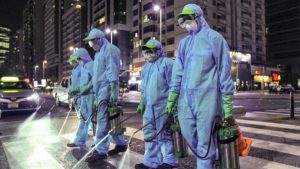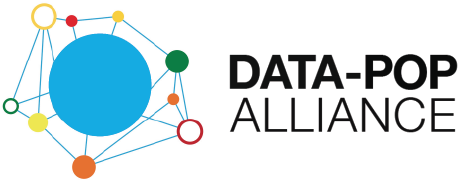United Arab Emirates
Information last updated: 16 June, 2020
- Population: 9.6 M
- Population +65 yo: 1%
- GDP Per Capita: 67,550 USD
- Informal employment: Not available
- First registered case: 29 January
- Hospital beds: 1.50 (per 1000 people)
Sources: TheWorld Bank and WHO (Population over 65 years old, Informal employment, GDP-PPP, Hospital beds).
Status
As of June 16, 2020: 42,636 infected (out of which 14,216– active); 291 deaths; 28,129 recovered; 1 critical case (Source: National Emergency Crisis and Disasters Management Authority).
Level of confinement and until when: as of June 16, 2020, due to the ongoing National Disinfection Programme, movement for Dubai residents is restricted from 11 pm – 6 am; from 10 pm – 6 am for the residents in other Emirates.
Response set up and capacity
Stakeholder Mapping
Entities / Organizations
• National Emergency Crisis and Disasters Management Authority (NCEMA) Ministry of Health & Prevention (MoHAP)
• Ministry of Interior
• UAE Government Communication Office
Additional actors
• Ministry of Community Development (MoCD)
• Ministry of Foreign Affairs and International Cooperation
• Ministry of Education
• Telecommunications Regulatory Authority (TRA)
Emirate- level health authorities:
• Dubai Health Authority
• Department of Health Abu Dhabi
• Dubai’s Supreme Committee for Crisis and Disaster Management
Mitigating factors - What is being done?
UAE’s response to COVID-19 timeline:
- March 3: Schools and universities moved to online learning and are to stay closed until the end of the year.
- March 13: Remote work for government employees is announced.
- March 16: Mosques, churches, temples and other places of worship close.
- March 21: Beaches, parks, and pools, parks, movie theatres, and gyms close.
- March 22: Announcement of closures of Restaurants, Cafes, and Food and Beverage Outlets
- March 23: Closure of malls, restaurants serve deliveries only, groceries remain open.
- March 25: All passenger flights are suspended.
- March 25: Dubai Economy obliged 80% of private sector employees to work from home.
- March 27: Ministry of Health and Prevention and the Ministry of Interior start National Disinfection Program; imposed curfew from 8 pm to 6 am. Program extends until April 4th.
- March 27: Dubai launched online permit system – residents have to register before stepping out of the house even for essential needs. Violators are fined or imprisoned.
Photo credits: Victor Besa / The National
- March 30: UAE President His Highness Sheikh Khalifa bin Zayed Al Nahyan passes the law regulating food stocks in the country
- Apr 3: The Department of Health-Abu Dhabi launched “Stay home” app to track people advised to self-quarantine.
- April 4: 24-hour curfew in Dubai announced. Residents are allowed to leave homes only for essential needs; Metro and tram services suspended.
- April 13: UAE sets up mass testing across the country’s seven emirates with a capacity of testing 500 people per day.
- April 15: Dubai’s exhibition center is turned into a hospital with a capacity of 3,000 patients, including 800 intensive care beds.
- April 24: partial ease of restrictions in Dubai – people are allowed to go outside during the day time without a permit; opening of malls, cafes and restaurants.
- April 25: Abu Dhabi starts national sterilization program during Ramadan; residents cannot go out from 10 pm to 6 am.
- April 29: Announcement that Dubai will possibly welcome tourists back in July.
- May 11: Abu Dhabi Police introduces an online permit system for people who have urgent needs to go out during the hours of National Sterilization Program (10 pm – 6 am).
- May 11: MOHAP provides services for more than 15,000 patients via their virtual clinics.
- May 14: To acknowledge hard work of 200+ Dubai’s health care professionals, the government issued them “Golden Visas” that allow them to stay 10 years in the country.
- May 27: The government announces that public sector employees may gradually go back to the offices.
- June 6: UAE plans to test all 9+ million residents; as of May 27th, 2 million have already been tested.
- June 9: Continuation of the National Screening Programme in Abu Dhabi emirate – provision of free tests for COVID-19 and restriction of movement.
Mitigating actions on mental health:
- Numerous measures have been taken by the government and private sector entities to support UAE residents’ psychological and mental health needs throughout the pandemic. The Federal Authority for Government Human Resources provides mental health support service “Hayat” or “Employees Assistance Programme” for government employees. In addition to existing resources, UAE National Programme for Happiness and Wellbeing set up a free hotline and a WhatsApp number for Arabic and English speakers to support mental health.
- MoCD introduced “Taaluf” 24/7 Family Counselling through hotlines, video calls, and weekly live streaming via Instagram. Private companies, such as VPS Healthcare started a VPS Cadabams “Mindtalk” – 24/7 online counselling platform; Thrive Wellbeing Center provides free support group webinars.

Risks, vulnerabilities, obstacles
- After a steady rise, the number of cases started declining after May 22nd. To control the spread of COVID-19 during the Eid holiday, the UAE government banned large celebrations, reduced mall operating hours and restricted movement until 8 pm.
- As more than half of the UAE’s economy is supported by the services industry, one of the industries largely hit during the pandemic, the government announced extensive stimulus packages totaling almost $27 billion that include fees waivers, utilities subsidies, and cancellation of certain fines and penalties.
- Due to a substantial decrease in passenger flights, UAE’s Emirates and Etihad airlines implement temporary salary cuts.
- World EXPO 2020 was postponed from initial October 2020 start to October 2021.
- Dubai’s Supreme Committee of Crisis and Disaster Management set up a hotline number for the public to verify the rumors and stop the spread of misinformation.
- Large number of tourists and immigrants were repatriated to India (16,000 out of 400,000 registered requests), Pakistan (20,000 out of 82,000 registered requests), Philippines (6,000 out of 7,000 registered requests).
- UAE supports affected COVID-19 patients and their families by providing free treatment, food supply for low-income families, and other in-kind support.
- As of May 12, UAE has provided humanitarian assistance in the form of medical supplies and food aid that benefitted more than 500,000 medical workers in 47 countries. (ReliefWeb).

Photo credit: Tariq Alfaham, Mohammed Aamir, WAM News
Potential actions and demands
- Dubai Municipality expressed the concern about treating medical waste as it can be hazardous. Currently, it is being treated by Jebel Ali Hazardous Waste Treatment Facility and Abu Dhabi Waste Management Center.
Key resources
- The United Arab Emirates Government portal.
- UAE’s official news source Emirates News Agency (WAM) updates.
- Dubai Department of Health latest information on COVID-19.
- Abu Dhabi Department of Health latest information on COVID-19.
- FCSA’s consolidated report on the government’s economic response to COVID-19.
Contributor(s): Aizhan Kapysheva.



